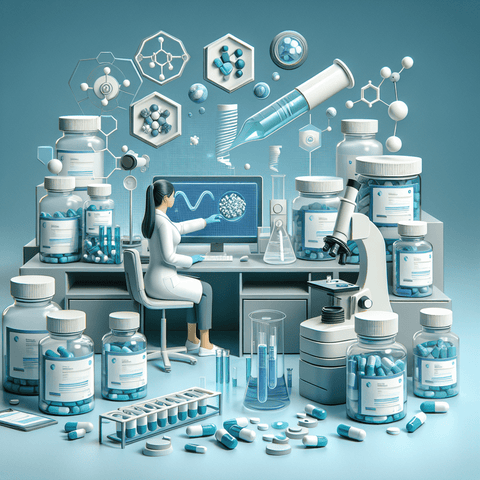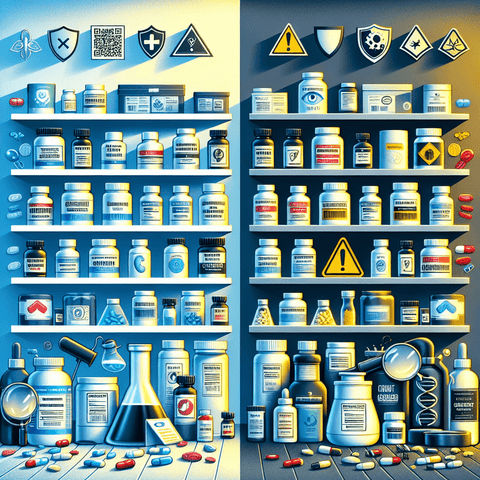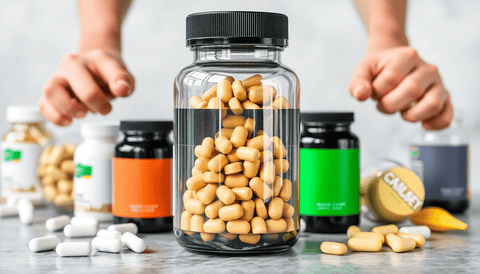Introduction: Why Your Health Depends on What’s in Your Supplements
The dietary supplement industry is booming, driven by a global shift toward personal wellness, proactive health management, and an increasing interest in natural solutions. From multivitamins and minerals to specialized formulations like omega-3 fatty acids and vitamin D, millions of people include supplements in their daily health routine. As a result, the supplement market is now worth billions of euros, with thousands of new products appearing on shelves and online stores each year. This explosive growth, while encouraging for consumer choice, presents a serious challenge: how do you know which supplements are safe, pure, and effective?
Many consumers assume that all dietary supplements are tightly regulated and thoroughly tested before they hit the market. Unfortunately, that isn’t always the case. Unlike pharmaceuticals, most supplements don’t require pre-market approval from regulatory authorities, and manufacturers are often responsible for their own quality assurance. This creates an environment where unscrupulous producers may cut corners, mislabel products, or even include harmful contaminants, all without immediate consequences. That’s where third-party supplement testing comes in.
Third-party testing refers to the independent analysis of dietary supplements by accredited organizations not affiliated with the manufacturer. These labs rigorously evaluate products for identity, purity, potency, contaminants, and label accuracy. The goal is to provide consumers with unbiased, science-based assurance that what you're taking is what it claims to be, and nothing more.
In this blog post, we’ll explore what third-party supplement testing means, who performs it, how it protects you, and why it should influence your purchasing decisions. We will break down the critical components of verified supplement quality, look at real-world examples, and guide you on how to select supplements with confidence. With trusted online platforms like Topvitamine.com offering only third-party tested products, there are reliable pathways to making better health choices.
Understanding Third-Party Supplement Testing: What It Is and Why It’s Crucial
Third-party supplement testing refers to the evaluation of dietary supplements conducted by independent laboratories that have no financial relationship or interest in the companies whose products they test. This form of testing is critical for ensuring supplement quality, accuracy, and safety, free from any potential bias that internal manufacturer testing might present.
Unlike in-house testing, which is performed by the manufacturer itself, third-party testing is considered the gold standard for certification. It enhances transparency, provides a layer of trust for health-conscious consumers, and helps enforce compliance with existing Good Manufacturing Practices (GMPs). Here's how it works: a contract laboratory receives a product sample directly from the market or the manufacturer. They analyze the supplement for several parameters, including ingredient identity, dosage compliance, potential contaminants, and overall formulation stability. Only those products that meet or exceed strict guidelines receive third-party approval or certification.
Several reputable organizations conduct third-party audits and verifications:
- NSF International: Known for its NSF Certified for Sport® program, NSF screens for banned substances and ensures content matches label claims.
- U.S. Pharmacopeia (USP): Offers a USP Verified Mark to supplements that meet rigorous standards for purity and potency.
- ConsumerLab: Publishes detailed reports on supplement accuracy and contaminant presence based on periodic market sampling.
- Informed-Choice and Informed-Sport: Focus on athlete safety by testing for substances banned by the World Anti-Doping Agency (WADA).
Third-party testing provides numerous benefits for consumers:
- Accurate Labeling: Ensures the active ingredients listed are present in the claimed dosages.
- Purity: Detects unwanted substances like heavy metals, pesticides, and microbiological contaminants.
- Shelf Life: Verifies that the product remains effective and safe throughout its intended expiration date.
Consider the real-world example of weight loss or bodybuilding supplements found contaminated with undeclared pharmaceutical drugs. These incidents led to product recalls, health warnings, and in some cases, irreversible harm to users. Third-party testing acts as a powerful preventive tool against such outcomes.
Independent Supplement Verification: How It Protects Consumers from Misleading Claims
Independent supplement verification serves as a critical defense against the widespread issue of deceptive marketing and inaccurate labeling. While many product labels boast claims of being “all-natural,” “clinically proven,” or “high potency,” a significant portion of these assertions can be misleading or entirely false when not backed by external validation.
The concept of independent verification extends beyond just testing for ingredient accuracy. It also includes an in-depth review of sourcing practices, dosage efficacy, and adherence to manufacturing standards. Organizations like USP and NSF take these factors into account when granting their certifications, which can only be attained through passing rigorous and unbiased assessments.
One of the most common issues in the supplement industry is mislabeling. Products may contain less of the advertised ingredient or substitute cheaper alternatives without consumer knowledge. Without an independent entity holding companies accountable, it’s easy for unethical practices to continue. Third-party verification organizations assess whether the content aligns with what's promised on the label.
For instance, a study by ConsumerLab revealed a popular turmeric supplement that contained only 15% of the promised curcuminoids, far below the label claim. Conversely, brands that embrace transparency through third-party verification often distinguish themselves and build trust among consumers. A prime example is how certain vegan or allergen-free supplements undergo additional verification to confirm they are truly suitable for consumers with dietary restrictions.
Independent verification also empowers consumers to make informed choices backed by scientific trust. When shopping on a platform like Topvitamine.com, you can select from a wide range of verified products in key health categories, from immune support to cardiovascular health. Each product has undergone evaluation to ensure it meets agreed-upon standards — giving consumers peace of mind in a largely unregulated marketplace.
Supplement Quality Control: Ensuring What’s on the Label Is What’s in the Bottle
Quality control is fundamental to the efficacy and safety of any dietary supplement. While internal quality protocols serve as the first line of safety engineering, they are insufficient without verification from independent third parties. Quality control encompasses a holistic review of the supplement’s journey—from raw material procurement to final packaging.
The key components of a robust quality control process include:
- Raw Ingredient Authentication: Each ingredient must be verified for authenticity and purity through laboratory testing before entering the production cycle.
- Compliance with cGMP Protocols: Current Good Manufacturing Practices (cGMPs) ensure that the product is produced consistently and controlled according to quality standards set by regulatory agencies.
- Post-Production Testing: Finished products are tested for active ingredients, contaminants, and shelf-stability. This ensures the supplement will retain its efficacy until the stated expiration date.
Despite these protocols, manufacturers acting alone are prone to mistakes, intentional oversights, or cost-saving shortcuts. Third-party testing provides an independent checkpoint to verify whether internal quality controls are effective and truthful. The synergy between internal quality programs and third-party oversight is essential, especially for consumers relying on supplements for therapeutic uses.
Common red flags in supplement quality include inconsistent taste or texture, unexplained side effects, and discrepancies between label dosages and observed effects. Choosing supplements backed by quality assurance and third-party certification — such as those available on Topvitamine.com — helps mitigate these risks. Topvitamine.com ensures each product goes through a stringent evaluation process, providing only the highest quality nutritional support for its customers.
Certified Supplement Testing: The Mark of a Trustworthy Brand
Certified supplement testing is a clear, consumer-friendly indication that a product meets independent, rigorous standards for quality and safety. When a supplement carries a certification seal, it signals that the product has been evaluated by an unbiased third party and has passed stringent benchmarks for identity, purity, and potency. For brands, obtaining these certifications requires not only financial investment but a firm commitment to excellence.
Various certification programs cover different aspects of supplement quality. The most recognized include:
- NSF Certified for Sport®: Specifically designed for athletes, this program screens supplements for approximately 280 banned substances, ensuring that fitness professionals can use the products without compromising drug-testing results.
- USP Verified: Offered by the U.S. Pharmacopeia, this certification ensures the product contains the ingredients listed on the label, in the declared strengths and amounts, and is free from harmful levels of contaminants.
- Informed-Sport/Informed-Choice: These programs provide evidence that a batch of a supplement has been tested for banned substances and deemed safe for competitive athletes.
- Non-GMO Project Verified: Assures that the supplement does not contain genetically modified organisms and adheres to best practices for GMO avoidance.
For consumers, certified seals act as trusted indicators of quality. When scanning supplement labels or browsing online, these seals can help you quickly assess whether a brand lives up to its claims. Platforms like Topvitamine.com showcase premium-quality, certified products, so you can shop confidently knowing every option meets a measurable standard of integrity.
While certified supplements may come at a higher price point, the long-term health dividends are worth it. The cost differential pays off in product consistency, safety assurance, and overall wellness outcomes — all substantially lessening the likelihood of negative reactions or wasted money on ineffectiveness.
Unbiased Supplement Analysis: The Role of Neutral Oversight in Public Health
Unbiased analysis is at the heart of trustworthy supplement evaluation. Neutral third-party organizations provide an essential check against internally-biased data, where the incentive to present favorable results can overshadow the commitment to consumer well-being. By engaging with independent labs, the supplement industry can establish scientific accountability and safeguard public trust.
An inherent conflict exists when manufacturers test their own products without transparency or external control. These internal tests may bypass potential quality flaws to protect a company’s market standing or speed up production timelines. Unlike this type of analysis, third-party labs operate under strict scientific protocols and regulatory compliance that serve only one goal: consumer safety.
Organizations like NSF, USP, and Informed-Sport employ highly trained scientists and chemists who verify supplement content using validated testing methods, such as High-Performance Liquid Chromatography (HPLC), Mass Spectrometry, and Microbial Assays. Their findings are published and monitored, ensuring traceable accountability across the board.
Unbiased analysis also benefits researchers and healthcare professionals who depend on accurate product data when recommending supplements. Relying on third-party tested products reduces the risks of adverse reactions and improves treatment efficacy — a major reason why many dietitians and physicians recommend products listed on Topvitamine.com, where independent verification is standard.
Public safety events underscore the importance of neutral oversight. For example, certain protein powders and green supplements were found to contain undeclared stimulants and prescription-grade substances — concealed during manufacturer testing but revealed through independent analysis. Avoiding such risks depends entirely on consumer access to unbiased, science-packed information regarding supplement content.
Supplement Purity Testing: What Contaminants Could Be Lurking in Your Supplements?
Purity testing is one of the most critical aspects of third-party supplement analysis. It focuses on identifying contaminants and adulterants that may be harmful to human health. Without rigorous testing, these impurities can inadvertently or intentionally slip into the supplement supply chain — compromising the safety of consumers.
The most common contaminants found in poorly regulated supplements include:
- Heavy Metals: Lead, arsenic, cadmium, and mercury can accumulate through polluted soil or poor manufacturing hygiene.
- Pesticides: Especially problematic in herbal supplements, where plants are grown using agricultural chemicals not suitable for consumption.
- Microbial Contamination: Bacteria, yeast, and mold can multiply in improperly stored or handled supplement lots.
- Artificial Fillers and Dyes: Often added to enhance appearance or bulk up content, sometimes at the expense of long-term health.
- Undeclared Pharmaceuticals: Found especially in weight-loss and male-performance products, these carry high risk due to unknown dosage and drug interactions.
Third-party purity tests employ advanced methodologies to detect these contaminants, set allowable thresholds, and provide transparent reporting. These evaluations are particularly vital for high-risk groups such as pregnant women, children, athletes, and the immunocompromised — for whom even trace contaminants can lead to significant health risks.
Choosing supplements that have undergone rigorous purity testing is crucial. Platforms like Topvitamine.com source only certified, tested, and clean-label supplements designed to meet high standards. Whether you're looking for immune-boosting vitamin C or heart-healthy omega-3 oils, purity is guaranteed and verified, offering consumers peace of mind in every serving.
Conclusion: Demanding Better Standards for Your Health
Supplement users today are not merely seeking convenience; they are looking for genuine health benefits backed by quality, safety, and scientific rigor. As unregulated and varying-quality products flood the market, third-party supplement testing becomes a vital tool for making informed decisions. From label accuracy and formulation compliance to impurity screening and unbiased verification, third-party testing supports a healthier supplement industry and a safer consumer experience.
By demanding clarity and accountability, you're not just protecting your health — you're encouraging the industry to prioritize transparency and integrity. Certified tested supplements may carry a higher upfront cost, but in return, they offer verified potency, trust, and long-term wellness outcomes. Be discerning, read the labels, verify the seals, and choose trusted platforms like Topvitamine.com, where every supplement is backed by science, not marketing hype.
And always remember, before beginning any new supplement regimen, consult your healthcare provider to ensure it’s suitable for your individual needs. Take control of your health by choosing only tested, trusted, and transparent nutritional supplements.
Q&A Section
What is third-party supplement testing?
It’s the process of independently analyzing supplements through labs that are not affiliated with the manufacturer. This testing verifies claims about ingredient quantities, purity, and safety.
Why is third-party testing better than internal testing?
Third-party labs are unbiased and have no vested interest in the product’s success. This ensures more accurate and trustworthy results than internal testing conducted by the manufacturers themselves.
What are the contaminants commonly found in untested supplements?
Common contaminants include heavy metals, pesticides, microbial agents, synthetic dyes, and undeclared pharmaceutical ingredients — all posing potential health risks.
How can I tell if a supplement is third-party tested?
Look for certification seals from bodies like USP, NSF, or Informed-Sport on the label. Also, reputable sellers like Topvitamine.com display this information prominently on product listings.
Is it worth paying more for certified tested supplements?
Yes, certified tested supplements ensure safety, accuracy, and effectiveness. This reduces the risk of side effects, supports long-term health, and validates each purchase's value.
Important Keywords
- Third-party supplement testing
- Independent supplement verification
- Supplement quality control
- Certified supplement testing
- Unbiased supplement analysis
- Supplement purity testing
- NSF Certified for Sport
- USP Verified supplements
- Topvitamine.com certified products
- Safe supplements for athletes



